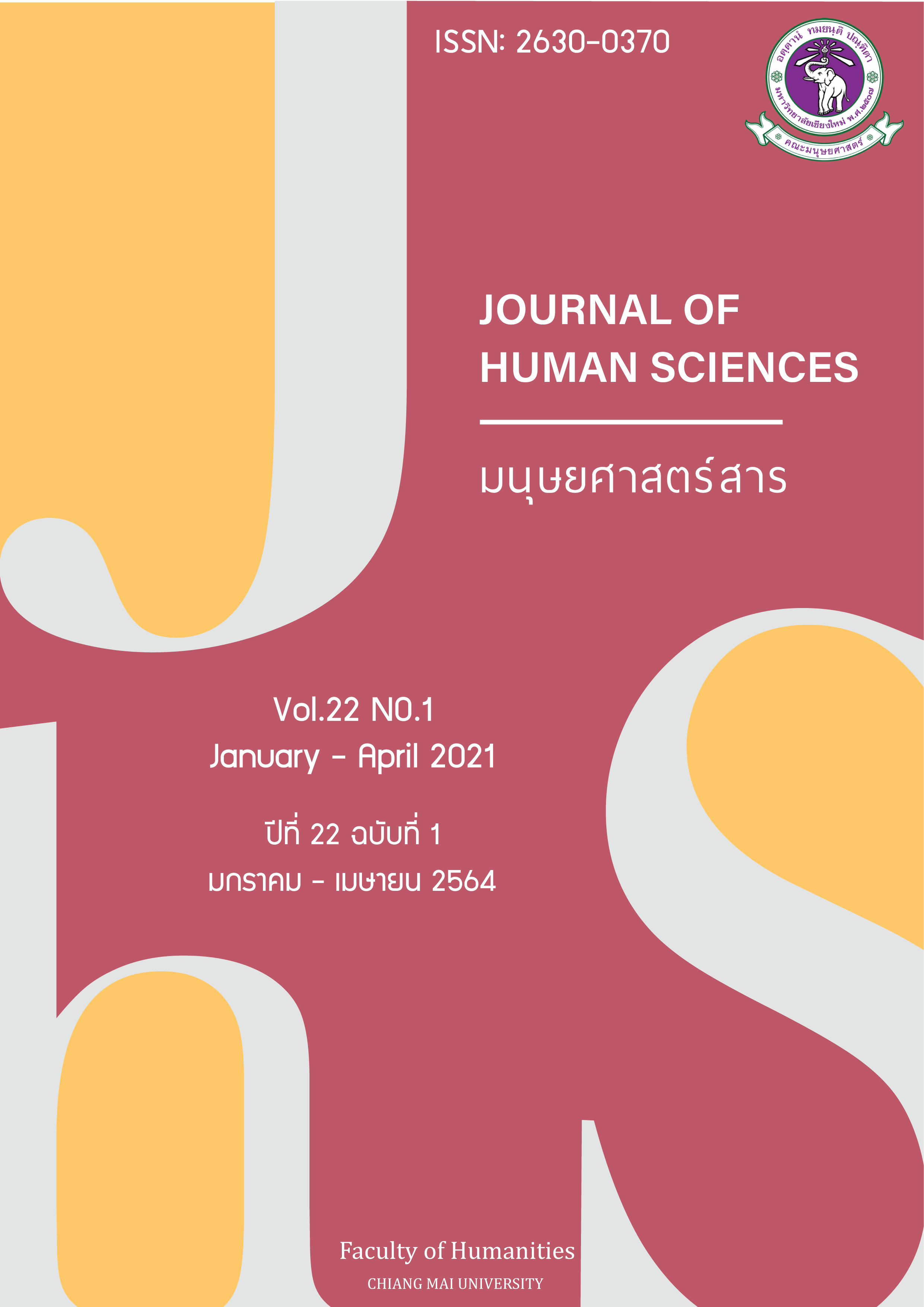การวิเคราะห์กระบวนการถ่ายทอดเพลงพิณตามภูมิปัญญาครูทองใส ทับถนน
Main Article Content
บทคัดย่อ
กระบวนการถ่ายทอด เป็นวิธีการแบ่งปันข้อมูลจากผู้ให้สู่ผู้รับ เพื่อการรักษาและสืบทอดภูมิปัญญา ดังนั้น การวิเคราะห์กระบวนการถ่ายทอดเพลงพิณตามภูมิปัญญาครูทองใส ทับถนน มีวัตถุประสงค์เพื่อวิเคราะห์กระบวนการถ่ายทอดเพลงพิณแบบฉบับครูทองใส ทับถนน ตามองค์ประกอบของหลักการศึกษา 4 ด้าน ได้แก่ ผู้สอน ผู้เรียน เนื้อหาสาระ และการจัดเรียนการสอน เป็นการวิจัยใช้ระเบียบวิธีวิจัยเชิงคุณภาพ ใช้วิธีการรวมรวมข้อมูลตามหลักทางมานุษยดุริยางควิทยา จากการศึกษาเอกสารและการทำงานภาคสนาม ตั้งแต่เดือนมิถุนายน–ตุลาคม พ.ศ. 2562 ร่วมกับการใช้แนวทางวิเคราะห์เนื้อหาตามหลักการดนตรีศึกษา โดยกำหนดขั้นตอนการดำเนินงาน คือ การศึกษาเอกสาร การทำงานภาคสนาม การวิเคราะห์ข้อมูล ผลการวิจัยข้อมูล 4 ประเด็น พบว่า 1) ครูทองใส ทับถนน เป็นผู้มีองค์ความรู้เกี่ยวกับวัฒนธรรมดนตรีพื้นบ้านอีสาน เป็นผู้มีประสบการณ์เกี่ยวกับการเป็นศิลปินพื้นบ้านอีสาน และเป็นผู้มีคุณลักษณะด้านความเป็นครูตามพระราชดำรัสของพระบาทสมเด็จพระปรมินทรมหาภูมิพลอดุลยเดช 2) กลุ่มผู้เรียนที่มีทักษะต้องการเรียนรู้ลายพิณขั้นสูงจากครูทองใส ต้องการให้ครูทองใสผูกลายหรือสร้างสรรค์ทำนองเพลงพิณเฉพาะบุคคล กลุ่มผู้เรียนที่ไม่มีทักษะต้องการเรียนรู้ลายพิณและต่อลายแบบฉบับทองใส ต้องการเรียนรู้เทคนิคการบรรเลงพิณแบบฉบับทองใส 3) เนื้อหาในการถ่ายทอดแบ่งออกเป็นสาระ 4 ด้าน คือ ด้านท่าทางการบรรเลง ด้านการตั้งสาย ด้านบทเพลง และด้านเทคนิคการบรรเลง 4) การถ่ายทอดเพลงพิณของครูทองใส ทับถนน เป็นไปตามแนวทางการจัดการเรียนการสอนของเกลเซอร์ (Glaser) จำนวน 4 ประเด็น คือ มีจุดประสงค์การสอน มีการประเมินสถานการณ์ของผู้เรียนก่อนสอน มีการจัดกระบวนการเรียนการสอน และมีการประเมินผล การวิเคราะห์ภูมิปัญญาพื้นบ้านเป็นการสะท้อนคุณค่าทางวัฒนธรรม ซึ่งนับว่าเป็นมรดกของชาติเพื่อให้ผู้ที่สนใจได้ศึกษา
Article Details
เอกสารอ้างอิง
Arunrotangkun, A., & Tadaamnuaychai, M. (2017). Chongthang Kan Chat Chamnai Phapphayon Thai Khong Phu Sang Itsara Korani Sueksa Rueang Phubao Thaiban Isan Indy [Movie Distribution Channel of Independent Filmmaker: Case Study of PBTB Movie]. Siam Communication Review, 16(20). 169-180.
Buriram Primary Education Sevice Area Office. (2018). Phon Karnnkhangkhan Sillapa Isan Prapet diaw dontri phuenmueang diaw phin [Summary report of 68th Northeastern Art and Culture Competition of the Students' Phin Solo]. n.p.
Chantranuson, K. (2003). Karn Plianplaeng Lokkathat Nai Klonlam Rueang Ruam Samai Phoso 2537-2543 [The change of worldviews in the contemporary klonlamruang 1994-2000]. (Master of Arts Program in Thai Studies, Mahasarakham University).
Danpradit, P. (2020). Kran-ookbab Withi-wichai Puea Pradit lea Thaythod thang diaw [Research Design for Recreate of Melodic and Transition solo]. Valaya Alongkorn Review, 10(1). 109-121.
Kaownil, A. (2019, August 3). Interview.
Khemmani, T. (2017). Sart Karnsorn (Phim Khrang thi 21) [Science of Teaching (21st ed.)]. Bangkok. Chulalongkorn University Press.
Klaophimai, R., & Suttachitt, N. (2018). Krabuankarn Thaythod Karnbanleng Diaw rarad-ek khong Krupinit Chaisuwan Sinlaphin Hangchart [Transmission Process in Ranard–ek Solo of Pinit Chaisuwan, National artist]. An Online Journal of Education (JED), 13(2). 400-411.
Miller, T. E., & Shahriari, (2012). World Music A Global Journey (3rd ed.). NY: Replika Press.
Musika, K. (2015). Naeo Khwam Khit Kan Sangsarn Nattayapradit Isan Nuang Ponglang
[A Concept of Esarn Choreography for Ponglang Band]. (Doctor of Philosophy Program in Thai Dance, Chulalongkorn University).
Nanongkham, P. (2011). Modern Isan Music as Image: A Positive Identity for the People of Northeast Thailand. (Doctoral Dissertation, Kent State University).
Office of the Basic Education Commission. (2018). Gan Karn Karnnkhangkhan Mahakam Kwamsamart Tang Sillapatattakam Wichakarn Technology Khrang Thi 68 [Regulations of the 68th Students' Arts a crafts Academic Fair]. Retrieved from https://www.sillapa.net/rule61/esanmusic68.pdf
Office of the National Education Commission. (2002). Kru Phumipanya Roonthi 2 Pak tawan-ouk Chiang Neua (Phim Khrang thi 2) [Teachers of Thai Knowledge Section 2 Northeastern Region (2nd ed.)]. Bangkok. Kurusapa Ladprao.
Pavaboot, S. (2015). Chudwicha Karn pattana Kwampen Kruwichachip [Teacher Professional Development Handout]. Bangkok: Faculty of Education, Suan Sunandha Rajabhat University.
Prasitworawit, N. (2010). Naeokid Chatniyom Lae Boribot Thang Sangkhom Thai Nai Phapphayon Action Thai Rawang Phutthasakkarat 2540-2551 [Nationalism and Social Context in Thai Action Films during 1997-2008]. (Master of Arts Program in Film, Chulalongkorn University).
Saenwa, S. (2020). kanthaythod OngKhwamru Phumpanya Thongthin Hatthakam Chaksan Nai Phaktawan ok Chiangnuea Khong Prathet Thai [Knowledge Transfer of Local Wisdom on Wickerwork Handicrafts in the Northeastern Region of Thailand]. Journal of Human Sciences, 21(3). 177-199
Seekhunlio, W. (2011). Technic Karnbanleng Phin Khong Sinlaphin Phunban Isan [Phin Performing Techniques of Isan Folk Musicians]. (Master of Fine and Applied Arts Program in Music, Mahasarakham University).
Sinthubun, S. & Sinthubun, K. (2019, October 30). Interview.
Sornprasit, S. (2019, July 27). Interview.
Sornprasit, S. (2019, July 5). Interview.
Suttachitt, N. (2012). Dontri Suksa (Phim Khrang thi 9) [Music Education (9th ed.)]. Bangkok: Active.
Tabtanon, S. (2019, July 5). Interview.
Tabtanon, T. (2019, August 3). Interview.
Tabtanon, T. (2019, July 27). Interview.
Tabtanon, T. (2019, July 5). Interview.
Thowtawee, P. (2000). Karn Phatthana Khong Molam Nai Mueang Ubonratchathani [The Deverlopment of Mawlum in Ubonratchatani]. (Master of Arts Program in History, Chiang Mai University).
Udomvong, J. (2019, October 12). Interview.
Valaya Alongkorn Rajabhat University. (2010). Karn judrabob Karnrian Karnsron Teeyud phurian pen Soonklang Karnraenroo [Student Center Learning]. Ayutthaya: Tienwattana.
Yanyongkasemsuk, R. (2014). Lokaphiwat Thongthin Niyom Kapkan Hoyha Adit [Globalization, Localism and Nostalgia]. Burapha Journal of Political Economy, 2(2). 1-15.


